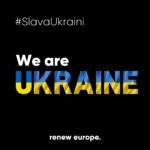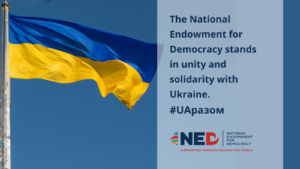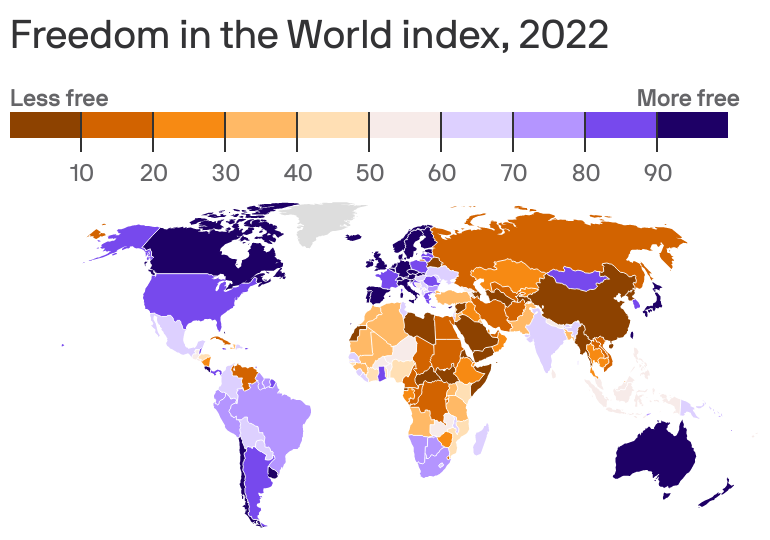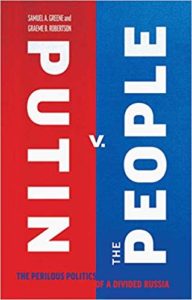Ukrainian President Volodymyr Zelenskyy, surrounded by several top officials, addressed the country Friday night local time from the doorstep of the presidential administration in central Kyiv to show he and other leaders haven’t fled the capital.
“All of us are here. Our military are here. Our civil society is here – defending our independence, our state. And we mean to keep it that way,” Zelenskyy said, according to a translation by the BBC.
Demonstrations sprung up across Russia to oppose the invasion, with authorities arresting more than 1,700 protesters.
“Our country, by order of President Putin, started a war with Ukraine,” the Russian journalist and Nobel laureate Dmitry Muratov said. “And there is no one to stop the war, so together with grief we feel shame.”
 If Russia gains sway over Ukraine, as it has over Belarus, it will carve out a new sphere of influence in Europe. Rival blocs will once again face off along an extended border. Western liberal democracy will be pitted against not communist but nationalist authoritarianism, The Financial Times adds:
If Russia gains sway over Ukraine, as it has over Belarus, it will carve out a new sphere of influence in Europe. Rival blocs will once again face off along an extended border. Western liberal democracy will be pitted against not communist but nationalist authoritarianism, The Financial Times adds:
Global democracies will have to rediscover, too, the resolve that enabled them to prevail in the last cold war. Three decades ago, they came to believe history was on their side. The calamity in Ukraine is a stark warning that they face a new struggle to prevail.
Beyond the €1.2 billion ($1.3 billion) package the EU adopted on February 21 to support Ukraine, Europeans need to reach out to civil society in Eastern Europe and Russia to energize those networks that have been the drivers of positive change across the former Soviet Union in the name of human rights, freedom, and self-determination, Carnegie’s Rosa Balfour states.
Putin has directly threatened pro-democracy activists and civil servants who led the pro-democracy push in the country after the 2014 revolution, reports confirm. “We know their names and we will find them and bring them to justice,” he said.
 The broadcast images of Russian attacks inside Ukraine show the real-time demise of a democracy in vivid and poignant terms, The Atlantic’s Ronald Brownstein observes. Ukraine’s agony is a terrible crucible, but it may help Biden forge stronger bonds among the world’s democracies.
The broadcast images of Russian attacks inside Ukraine show the real-time demise of a democracy in vivid and poignant terms, The Atlantic’s Ronald Brownstein observes. Ukraine’s agony is a terrible crucible, but it may help Biden forge stronger bonds among the world’s democracies.
The Ukraine crisis may prove a “transformative moment” that seals a broad international commitment to confronting Putin through the modern equivalent of the U.S.-led policy of “containment” against the Soviet Union during the Cold War, says Ivo Daalder, President Obama’s U.S. ambassador to NATO, now the president of the Chicago Council on Global Affairs.
But the Afghanistan withdrawal was neither competent nor collaborative, and “undermined” the Biden administration’s promise to provide a steadier hand and work more closely with allies. If “a competent foreign policy is a foreign policy that works together with allies and friends,” says Daalder, “for reasons that history at some point will explain, we just didn’t do a very good job on that when it came to Afghanistan.”
 Putin might be reasserting control over Ukraine in a physical sense, but not in a political and moral sense, says Council on Foreign Relations expert Charles A. Kupchan. When Russians ultimately ask, “Who lost Ukraine?,” the answer will be Putin. By invading Ukraine, Putin might well be overreaching and unwittingly sowing the seeds of the demise of his regime.
Putin might be reasserting control over Ukraine in a physical sense, but not in a political and moral sense, says Council on Foreign Relations expert Charles A. Kupchan. When Russians ultimately ask, “Who lost Ukraine?,” the answer will be Putin. By invading Ukraine, Putin might well be overreaching and unwittingly sowing the seeds of the demise of his regime.
“Power in Russia’s authoritarian political system is concentrated in the hands of President Vladimir Putin,” the latest Freedom House report states.
“With loyalist security forces, a subservient judiciary, a controlled media environment, and a legislature consisting of a ruling party and pliable opposition factions, the Kremlin is able to manipulate elections and suppress genuine dissent. Rampant corruption facilitates shifting links among state officials and organized crime groups,” say the authors of Freedom in the World 2022: The Global Expansion of Authoritarian Rule.

As a young journalist covering the first Chechen war from 1994-1996, I learned what Russian authorities were capable of, adds Marko Mihkelson, The carpet bombing of Grozny killed thousands upon thousands of citizens. For what? To stop the empire from disintegrating and the free will of the people from becoming the norm.
 Through the decades, Russia has painted democratic Western countries as scary enemy figures trying to obtain access to its riches and destroy its “thousand year old civilization,” he writes for The Moscow Times:
Through the decades, Russia has painted democratic Western countries as scary enemy figures trying to obtain access to its riches and destroy its “thousand year old civilization,” he writes for The Moscow Times:
Historical parallels offer us food for thought. Just like in the 1930s, Russia has come to the realization that the situation in Europe is ripe for changing the current status quo. In addition to restoring its empire, totalitarian Russia dreams of forcing its rules on the democratic West, setting up new zones of influence, and marginalizing the role of the United States in global politics.
Putin has spent much of the last decade restructuring Russian politics around the idea that the nation faces existential threats from outside its borders — aided by traitors within, note Samuel Greene and Graeme Robertson, co-authors of “Putin v. the People: The Perilous Politics of a Divided Russia.” That framing tars all domestic opposition as tools of foreign powers and justifies the evisceration of independent media, civil society and political parties besides his own, they write for The Washington Post:
Surprisingly large protests (“solo pickets,” as the Moscow Times puts it, are the only lawful form of protest in Russia) have appeared on the streets of Russian cities. These are likely to be easily suppressed — the Russian nongovernmental organization OVD-Info reported that more than 1,700 people were arrested on Thursday — but unease is mounting. The Committee of Soldiers’ Mothers, a grass-roots group that emerged to oppose Russia’s destructive war in Chechnya in the 1990s, has publicized harrowing pictures of the poor conditions in which soldiers are being housed and fed along the border with Ukraine and launched a video campaign against the war. Any combat deaths on the Russian side are likely to feed this nascent movement.

Levada
Shortly before the invasion began, sociologist Aleksei Levinson of the independent Levada Center polling agency told RFE/RL-VOA’s Current Time that public opinion in Russia was dominated by a “fear of war” that nonetheless did not rise to the level of “anti-war sentiment.”
Levada Center Director Denis Volkov said the Kremlin has skillfully convinced many Russians that the conflict at the heart of Russian aggression against Ukraine was not between Russia and Ukraine but between Russia and the United States.
“America is to blame for everything,” he said in an interview with Russia-focused media outlet Meduza, paraphrasing a narrative that has been laid out by officials and state media. “It isn’t even Ukraine, but America and the West. They are pushing Ukraine, which is plotting something against [the Russia-backed separatists], and Russia has to come to their aid because they are Russian-speakers and, in a nutshell, ‘our’ people.”
 Revived Soldiers Ukraine is a nonprofit organization working to provide aid to the people of Ukraine “in support of their fundamental human rights and medical rehabilitation of Ukrainian soldiers.” Its website lists various ways to help, WGTN reports.
Revived Soldiers Ukraine is a nonprofit organization working to provide aid to the people of Ukraine “in support of their fundamental human rights and medical rehabilitation of Ukrainian soldiers.” Its website lists various ways to help, WGTN reports.
Based in Kyiv, the Ukraine Crisis Media Center (above) launched in 2014 when Russia occupied Crimea, in order to “promote the development of a self-sufficient Ukrainian state and society.”
Chinese internet users openly mocked what they saw as a toothless response by Western countries to the Russian assault on Ukraine, while drawing parallels to Taiwan, a separately-governed island off the coast of mainland China that Beijing has vowed to take control of, by force if necessary, The Wall Street Journal’s Sha Hua writes.
Putin has long been animated by a desire to be respected, to be held in esteem in Russia and to be regarded as legitimate on the world stage. But in succumbing to his belligerent imperial ambitions, he has cemented himself, forever, as a pariah, reports suggest.
Totalitarian Russia dreams of forcing its rules on the democratic West, @markomihkelson writes for @MoscowTimes https://t.co/zTlbSPmnN6
— Democracy Digest (@demdigest) February 25, 2022







